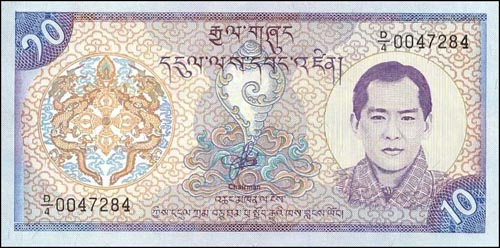
The government's massive decision of demonetisation has affected most -- if not all -- across the country. While thousands of people are lining up in queues for hours in front of banks and ATMs to exchange and withdraw a limited sum of money, people along the border in certain Northeastern states have been rescued from the ordeal, thanks to the Bhutanese currency ngultrum.
It has been a norm for people in remote villages in Assam along the Bhutan border to use the Bhutanese currency as a legal tender. From shopkeepers to rickshaw wallahs, everyone accepts the ngultrum in the border villages of Rangia, Barpeta and Dadguri to meet their daily expenses. In the times of demonetisation, the currency of Bhutan has come as a saviour for people who live in these villages with poor road connectivity and fewer banks and ATMs.
There has been a surge in the use of the Bhutanese currency in these Assamese villages near the Bhutan border ever since the demonetisation announcement by Prime Minister Narendra Modi. Modi, earlier this month, had announced that all the old Rs 500 and Rs 1,000 notes stand abolished and need to be exchanged at the bank within 50 days.
The decree from the government states that the public can exchange or deposit a maximum of Rs 2,000 per day at the banks and are allowed to withdraw a maximum of Rs 2,500 from the ATMs. The move of abolishing Rs 500 and Rs 1,000 notes has been made by the government to crackdown on black money in the country. The decision, however, has taken a toll on the common man.
Reports state that the value of the Bhutanese currency has surged by almost 25 percent to match the value of the Indian currency in the border areas.
"People in the Assamese villages near the Bhutan border have been accepting the Bhutanese currency since decades, we don't see the use of the currency in Bokaghat or Guwahati though, I heard about the use of ngultrum from my aunts and uncles who live in a border village called Barpeta. Most of the shop owners and rickshaw pullers accept the currency," Mridusmita Chowdhury, a resident of Bokaghat, Assam, said.
"I am sure the step taken by the government is for the country's good but we are thankful for the use of Bhutanese currency here. There is hardly any bank or ATM available in this village, if it were not for the Bhutanese currency, we would have had to travel far and long to get cash, life here would have come to a standstill. I read that new Rs 2,000 and Rs 500 notes have been released but nobody here has seen them yet," Antaripa Das, from Barpeta village, said.
The Supreme Court on Friday said that because of the demonetisation, the situation in various parts of India has become so grave that it may cause riots in the country. When the top court asked if there is any printing problem, referring to the recent decision of decreasing the exchanging amount to Rs 2,000 from Rs. 4,000, the government said that there was indeed a shortage of Rs 100 notes.












